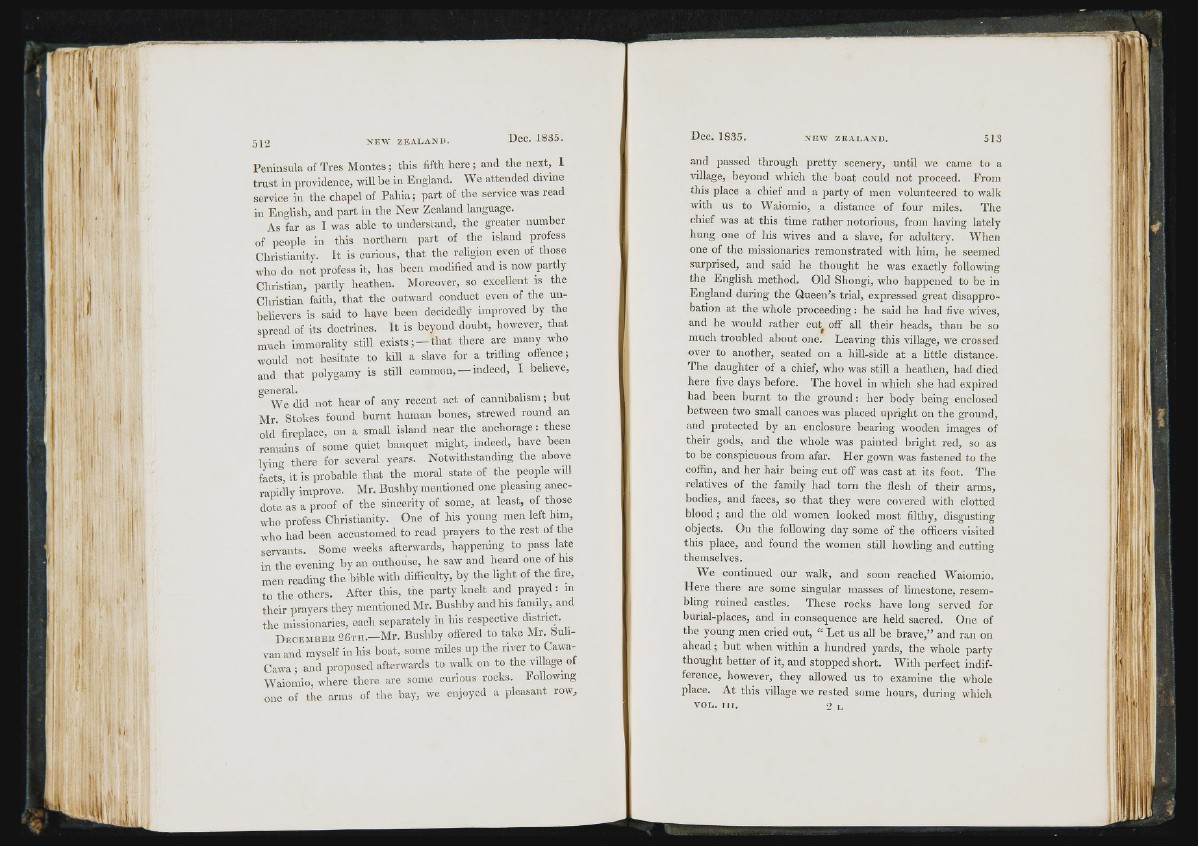
' I
iH
Peninsula of Tres Montes; this fifth here; and the next, I
trust in providence, will be in England. We attended divine
service in the chapel of Pahia; part of the service was read
in English, and part iu the New Zealand language.
As far as I was able to understand, the greater number
of people in this northern part of the island profess
Christianity. It is curious, that the religion even of those
who do not profess it, has been modified and is now partly
Christian, partly heathen. Moreover, so excellent is the
Christian faith, that the outward conduct even of the unbelievers
is said to have been decidedly improved by the
spread of its doctrines. It is beyond douht, however, that
much immorality still exists; — that there are many who
would not hesitate to kill a slave for a tnflmg offence;
and that polygamy is still common, — indeed, I believe,
^ We did not hear of any recent act of cannibalism; but
Mr Stokes found burnt human bones, strewed round an
old'fireplace, on a small island near the anchorage: these
remains of some quiet banquet might, indeed, have been
lyino- there for several years. Notwithstanding the above
factl, it is probable that the moral state of the people will
rapidly improve. Mr. Bushby mentioned one pleasing anecdote
as a proof of the sincerity of some, at least, of those
who profess Christianity. One of his young men left him,
who had been accustomed to read prayers to the rest of the
servants. Some weeks afterwards, happening to pass late
in the evening by an outhouse, he saw and heard one of his
men reading the bible with difficulty, by the light of the fire,
to the others. After this, the party knelt and prayed: m
their prayers they mentioned Mr. Bushby and his family, and
the missionaries, each separately in his respective district.
D e c e m b e r 26t h .— Mr. Bushby offered to take Mr. buli-
vanand myself in his boat, some miles up the river to Cawa-
Cawa; and proposed afterwards to walk on to the village ot
Waiomio, where there are some curious rocks. Following
one of the arms of the bay, we enjoyed a pleasant row.
and passed through pretty scenery, until we came to a
village, beyond which the boat could not proceed. From
this place a chief and a party of men volunteered to walk
with us to Waiomio, a distance of four miles. The
chief was at this time rather notorious, from having lately
hung one of Ids wives and a slave, for adultery. When
one of the missionaries remonstrated with him, he seemed
surprised, and said he thought he was exactly following
the English method. Old Shongi, who happened to be in
England during the Queen’s trial, expressed great disapprobation
at the whole proceeding: he said he had five wives,
and he would rather cut^ off all their heads, than be so
much troubled about one. Leaving this village, we crossed
over to another, seated on a hill-side at a little distance.
The daughter of a chief, who was still a heathen, had died
here five days before. The hovel in which she had expired
had been liurnt to the ground: her body being enclosed
between two small canoes was placed upright on the ground,
and protected by an enclosure bearing wooden images of
their gods, and the whole was painted bright red, so as
to be conspicuous from afar. Her gown was fastened to the
coffin, and her hair being cut off was cast at its foot. The
relatives of the family had torn the flesh of their arms,
bodies, and faces, so that they were covered with clotted
blood; and the old women looked most filthy, disgusting
objects. On the following day some of the officers visited
this place, and found the women still howling and cutting
themselves.
We continued our walk, and soon reached Waiomio.
Here there are some singular masses of limestone, resembling
ruined castles. These rocks have long served for
burial-places, and in consequence are held sacred. One of
the young men cried out, “ Let us all be brave,” and ran on
ahead; but when within a hundred yards, the whole party
thought better of it, and stopped short. With perfect indifference,
however, they allowed us to examine the whole
place. At this village we rested some hours, during which
V O L . H I . 2 L